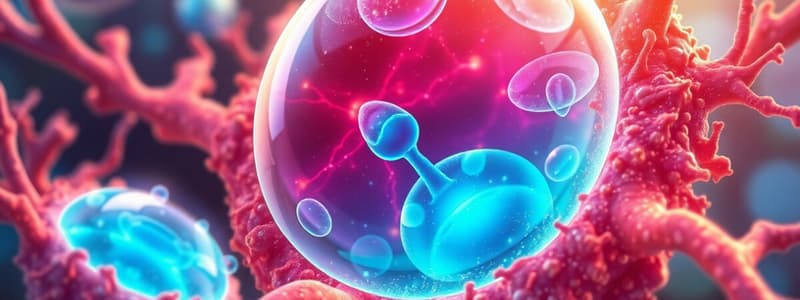Podcast
Questions and Answers
Which of the following is a basic unit of life?
Which of the following is a basic unit of life?
What regulates the movement of substances into and out of the cell?
What regulates the movement of substances into and out of the cell?
What role do genes play in living organisms?
What role do genes play in living organisms?
What is a key driving force of evolution?
What is a key driving force of evolution?
Signup and view all the answers
Which of the following concepts is not commonly associated with ecology?
Which of the following concepts is not commonly associated with ecology?
Signup and view all the answers
What does DNA replication ensure in living organisms?
What does DNA replication ensure in living organisms?
Signup and view all the answers
Which process is specifically involved in the creation of gametes?
Which process is specifically involved in the creation of gametes?
Signup and view all the answers
Which component of an ecosystem includes both living and non-living elements?
Which component of an ecosystem includes both living and non-living elements?
Signup and view all the answers
Study Notes
Introduction to Biology
- Biology is the study of life and living organisms, including their structure, function, growth, origin, evolution, distribution, and taxonomy.
- It encompasses a vast range of disciplines, such as botany (plants), zoology (animals), microbiology (microorganisms), and ecology (interactions between organisms and their environment).
- Biological concepts are interconnected and build upon each other, forming a complex and dynamic field of study.
- Key themes include evolution, structure and function, information flow, energy transfer, and interactions between systems.
Cell Biology
- Cells are the basic units of life.
- All living organisms are composed of cells, either single-celled or multicellular.
- Different cell types are specialized for different functions in an organism.
- Cell components include organelles, such as the nucleus, mitochondria, and ribosomes.
- Cell membranes regulate what enters and exits the cell.
- Mitosis and meiosis are the processes of cell division.
- Genetic material (DNA) dictates cell function.
Genetics
- The study of heredity and variation in living organisms.
- Genes are units of hereditary information located on chromosomes.
- Genes code for proteins, which carry out the functions of the cell.
- Genes can undergo mutations, leading to variations in traits.
- Inheritance patterns, such as dominant and recessive traits, can be determined through genetic analysis.
- DNA replication is vital for the transmission of genetic information.
- Molecular biology investigates the structure and function of DNA and RNA.
Evolution
- The process by which populations of living organisms change over successive generations.
- Driven by natural selection, where organisms with beneficial traits are more likely to survive and reproduce.
- Genetic variation within a population is essential for evolution.
- Over long periods, evolution leads to diversification of species and the adaptation of organisms to their environment.
- The fossil record provides evidence of evolutionary history.
- Common ancestry connects all organisms.
Ecology
- The study of the relationships between organisms and their environment.
- Includes the study of ecosystems, which encompass all living things and non-living components in an area.
- Key concepts in ecology include population dynamics, community interactions (e.g., predator-prey relationships), and energy flow.
- Ecosystems are complex systems with various trophic levels.
- Human impacts on ecosystems are a significant area of study.
- Biomes represent major terrestrial ecosystems characterized by specific climate and vegetation.
Microbiology
- The study of microorganisms, including bacteria, viruses, fungi, and protists.
- Many microorganisms are beneficial, while others can cause disease.
- Microorganisms play crucial roles in nutrient cycling and decomposition.
- Techniques like microscopy and culturing are used to study microorganisms.
- Antibiotics and other treatments are developed to fight microbial infections.
Studying That Suits You
Use AI to generate personalized quizzes and flashcards to suit your learning preferences.
Description
This quiz covers fundamental concepts in biology, focusing on the study of life and living organisms. It includes key themes such as evolution, cell structure, and the functions of various organelles. Test your knowledge of cell biology and the interconnectedness of biological disciplines.




